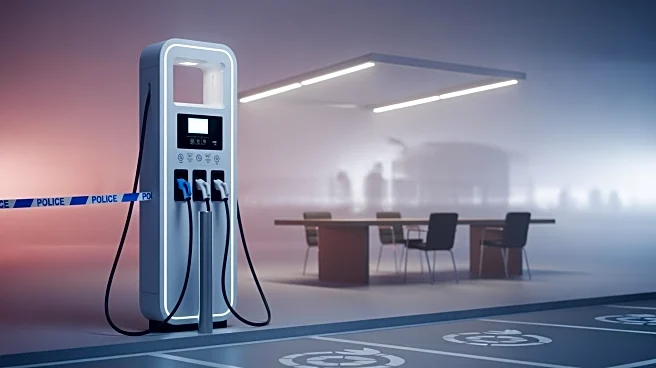What's Happening?
Alfa Romeo has announced the extension of the production of its Giulia model until 2027, a decision influenced by slower-than-expected adoption of electric vehicles (EVs). Originally set to cease production this
year, the Giulia, along with the Stelvio SUV, will continue to be manufactured at the Cassino plant. This extension is due to the need for more time to adapt the STLA Large platform to accommodate internal combustion engines for the next-generation models. The decision was revealed by CEO Santo Ficili during the presentation of the updated Tonale. The Giulia and Stelvio, which ride on the Giorgio platform, were initially planned to transition to EVs exclusively, aligning with Alfa Romeo's goal of going fully electric by 2027. However, the current market conditions have necessitated a reevaluation of this strategy.
Why It's Important?
The extension of the Giulia and Stelvio production highlights the challenges automakers face in transitioning to electric vehicles. This decision reflects broader industry trends where companies are adjusting timelines due to slower consumer adoption of EVs. For Alfa Romeo, maintaining internal combustion engine options allows the brand to cater to markets where EV infrastructure is still developing. This move could impact the company's strategic positioning, as it balances innovation with market realities. The decision also underscores the importance of flexibility in automotive manufacturing, as brands navigate the complexities of evolving consumer preferences and regulatory landscapes.
What's Next?
Alfa Romeo will continue to develop its next-generation models, incorporating internal combustion engines alongside potential EV options. The company is expected to focus on adapting the STLA Large platform to accommodate these changes. As the automotive industry progresses towards electrification, Alfa Romeo's strategy may influence other manufacturers facing similar challenges. Stakeholders, including consumers and industry analysts, will be watching how Alfa Romeo manages this transition and whether it can successfully integrate new technologies while maintaining traditional engine offerings.
Beyond the Headlines
The decision to extend production of the Giulia and Stelvio models raises questions about the long-term sustainability of internal combustion engines in the face of environmental concerns. As Alfa Romeo navigates this transition, it must consider the ethical implications of continuing to produce non-electric vehicles. This development may also prompt discussions on the role of government policies in accelerating EV adoption and the need for infrastructure improvements to support this shift.









